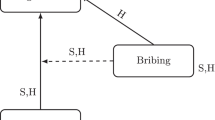Abstract
There has been a recent resurgence in the area of explainable artificial intelligence as researchers and practitioners seek to provide more transparency to their algorithms. Much of this research is focused on explicitly explaining decisions or actions to a human observer, and it should not be controversial to say that looking at how humans explain to each other can serve as a useful starting point for explanation in artificial intelligence. However, it is fair to say that most work in explainable artificial intelligence uses only the researchers’ intuition of what constitutes a ‘good’ explanation. There exist vast and valuable bodies of research in philosophy, psychology, and cognitive science of how people define, generate, select, evaluate, and present explanations, which argues that people employ certain cognitive biases and social expectations to the explanation process. This paper argues that the field of explainable artificial intelligence can build on this existing research, and reviews relevant papers from philosophy, cognitive psychology/science, and social psychology, which study these topics. It draws out some important findings, and discusses ways that these can be infused with work on explainable artificial intelligence.
Access this chapter
Tax calculation will be finalised at checkout
Purchases are for personal use only
Similar content being viewed by others
Notes
- 1.
IT: Information Technology.
- 2.
References
Atkinson, K., Bench-Capon, T.: Practical reasoning as presumptive argumentation using action based alternating transition systems. Artif. Intell. 171(10–15), 855–874 (2007)
Atkinson, K., Bench-Capon, T.J.M., Modgil, S.: Argumentation for decision support. In: Database and Expert Systems Applications (DEXA), pp. 822–831 (2006)
Bex, F., Walton, D.: Combining explanation and argumentation in dialogue. Argument Comput. 7(1), 55–68 (2016)
Cerutti, F., Norman, T.J., Toniolo, A., Middleton, S.E.: CISpaces.org: from fact extraction to report generation. In: Proceedings of COMMA 2018 Computational Models of Argument, pp. 269–280 (2018)
Cogan, E., Parsons, S., McBurney, P.: What kind of argument are we going to have today? In: Proceedings of the 4th International Joint Conference on Autonomous Agents and Multiagent Systems, pp. 544–551. ACM (2005)
Coulson, A., Glasspool, D., Fox, J., Emery, J.: RAGs: a novel approach to computerized genetic risk assessment and decision support from pedigrees. Methods Inf. Med. 40(4), 315–322 (2001)
Dung, P.M.: On the acceptability of arguments and its fundamental role in nonmonotonic reasoning, logic programming and \(n\)-person games. Artif. Intell. 77(2), 321–357 (1995)
Fox, J.: Will it happen? can it happen? a new approach to formal risk analysis. Risk Decis. Policy 4(2), 117–128 (1999)
Girle, R.A.: Commands in dialogue logic. In: Gabbay, D.M., Ohlbach, H.J. (eds.) FAPR 1996. LNCS, vol. 1085, pp. 246–260. Springer, Heidelberg (1996). https://doi.org/10.1007/3-540-61313-7_77
Gunning, D.: Explainable Artificial Intelligence (XAI). Defense Advanced Research Projects Agency (DARPA) (2017)
Kokciyan, N., et al.: Towards an argumentation system for supporting patients in self-managing their chronic conditions. In: Proceedings of the AAAI Joint Workshop on Health Intelligence (2018)
Krause, P., Fox, J., Judson, P., Patel, M.: Qualitative risk assessment fulfils a need. In: Hunter, A., Parsons, S. (eds.) Applications of Uncertainty Formalisms. LNCS (LNAI), vol. 1455, pp. 138–156. Springer, Heidelberg (1998). https://doi.org/10.1007/3-540-49426-X_7
McBurney, P., Parsons, S.: Chance discovery using dialectical argumentation. In: Proceedings of the Workshop on Chance Discovery, Fifteenth Annual Conference of the Japanese Society for Artificial Intelligence. Matsue, Japan (2001)
McBurney, P., Hitchcock, D., Parsons, S.: The eightfold way of deliberation dialogue. Int. J. Intell. Syst. 22(1), 95–132 (2007)
McBurney, P., Parsons, S.: Representing epistemic uncertainty by means of dialectical argumentation. Ann. Math. Artif. Intell. 32(1–4), 125–169 (2001)
McBurney, P., Parsons, S.: Games that agents play: a formal framework for dialogues between autonomous agents. J. Logic Lang. Inf. 11(3), 315–334 (2002)
McBurney, P., Parsons, S.: A denotational semantics for deliberation dialogues. In: Proceedings of the 3rd International Conference on Autonomous Agents and Multi-Agent Systems. IEEE Press (2004)
Miller, T.: Explanation in artificial intelligence: Insights from the social sciences. Artif. Intell. 267, 1–38 (2018). ISSN 0004-3702. https://doi.org/10.1016/j.artint.2018.07.007. http://www.sciencedirect.com/science/article/pii/S0004370218305988
Miller, T., Howe, P., Sonenberg, L.: Explainable AI: beware of inmates running the asylum. In: Proceedings of the IJACI Workshop on Explainable AI (2017)
Parsons, S., et al.: Argument schemes for reasoning about trust. Argument Comput Spec. Issue Trust Argum. Technol. 5(2–3), 160–190 (2014)
Parsons, S., McBurney, P., Sklar, E., Wooldridge, M.: On the relevance of utterances in formal inter-agent dialogues. In: Proceedings of the 6th International Conference on Autonomous Agents and Multiagent Systems (2007)
Parsons, S., Wooldridge, M., Amgoud, L.: Properties and complexity of some formal inter-agent dialogues. J. Log. Comput. 13(3), 347–376 (2003)
Parsons, S., Wooldridge, M., Amgoud, L.: On the outcomes of formal inter-agent dialogues. In: Proceedings of the 2nd International Conference on Autonomous Agents and Multi-Agent Systems. ACM Press, New York (2003)
Prakken, H.: Formal systems for persuasion dialogue. Knowl. Eng. Rev. 21(02), 163–188 (2006)
Rago, A., Cocarascu, O., Toni, F.: Argumentation-based recommendations: Fantastic explanations and how to find them. In: Proceedings of the 27th International Joint Conference on Artificial Intelligence, pp. 1949–1955 (2018)
Rahwan, I., Ramchurn, S.D., Jennings, N.R., Mcburney, P., Parsons, S., Sonenberg, L.: Argumentation-based negotiation. Knowl. Eng. Rev. 18(4), 343–375 (2003)
Rahwan, I., Simari, G.R.: Argumentation in Artificial Intelligence, vol. 47. Springer, Heidelberg (2009)
Rajendran, P.: Aggregating and Analysing Opinions for Argument-based Relations. Ph.D. thesis, University of Liverpool, Liverpool, June 2019
Shortliffe, E.H., Davis, R., Axline, S.G., Buchanan, B.G., Green, C.C., Cohen, S.N.: Computer-based consultations in clinical therapeutics: explanation and rule acquisition capabilities of the MYCIN system. Comput. Biomed. Res. 8(4), 303–320 (1975)
Sklar, E.I., Azhar, M.Q.: Argumentation-based dialogue games for shared control in human-robot systems. J. Hum. Robot Interact. 4(3), 120–148 (2015)
Tolchinsky, P., Cortes, U., Modgil, S., Caballero, F., Lopez-Navidad, A.: Increasing human-organ transplant availability: argumentation-based agent deliberation. IEEE Intell. Syst. 21(6), 30–37 (2006)
Walton, D., Krabbe, E.C.W.: Commitment in Dialogue: Basic Concepts of Interpersonal Reasoning. State University of New York Press, Albany (1995)
Walton, D., Reed, C., Macagno, F.: Argumentation Schemes. Cambridge University Press, Cambridge (2008)
Acknowledgements
This work was funded by EPSRC grant EP/P010105/1 CONSULT: Collaborative Mobile Decision Support for Managing Multiple Morbidities.
Author information
Authors and Affiliations
Corresponding author
Editor information
Editors and Affiliations
Rights and permissions
Copyright information
© 2019 Springer Nature Switzerland AG
About this paper
Cite this paper
Sassoon, I., Kökciyan, N., Sklar, E., Parsons, S. (2019). Explainable Argumentation for Wellness Consultation. In: Calvaresi, D., Najjar, A., Schumacher, M., Främling, K. (eds) Explainable, Transparent Autonomous Agents and Multi-Agent Systems. EXTRAAMAS 2019. Lecture Notes in Computer Science(), vol 11763. Springer, Cham. https://doi.org/10.1007/978-3-030-30391-4_11
Download citation
DOI: https://doi.org/10.1007/978-3-030-30391-4_11
Published:
Publisher Name: Springer, Cham
Print ISBN: 978-3-030-30390-7
Online ISBN: 978-3-030-30391-4
eBook Packages: Computer ScienceComputer Science (R0)




